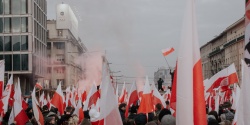Published: 24.09.2024

• On the order of the prosecutor's office, police drilled out a lock and forcibly entered the headquarters of the Independence March Association and seized documents and computer equipment belonging to the association, as well as other organizations located on the premises. This was on September 4 and it followed the decision by the voivod (the government’s representative at the regional level) to refuse to grant the Independence March the status of a cyclical manifestation, although it is held every year on November 11.
• On the same day, at 6 a.m., police officers appeared with prosecutorial search warrants at the apartments of the 2018 Independence March co-organizers. Meanwhile, an interrogation of the association's president, Bartosz Malewski, took place at the Capital Police Station, after which the police announced the prosecutor's decision to enter the association's headquarters forcibly.
• The pretext for the action was an alleged violation of Article 190 of the Criminal Code in which one of the participants of the 2018 Independence March issued criminal threats. Participation in the 2018 Independence March, on the 100th anniversary of Poland’s recovered independence, was estimated at some 250,000 people.
• The Ordo Iuris Institute is providing legal assistance to the Independence March Association.
“It is hard not to suspect that the actions of the prosecutor's office and the police are politically motivated,” asserts Bartosz Malewski, president of the Independence March Association. “The prosecutor's office is investigating a case involving the Independence March from six years ago. The prosecutor's office previously discontinued these proceedings, but they have now resumed since Adam Bodnar took control of Poland’s prosecution’s service. The actions of the security services are disproportionate to the gravity of the alleged crime of criminal threats by one of the participants in the Independence March. Especially since no one among the association's board of directors or volunteers is suspected of committing it. The seizure – on the grounds that an unidentified man may have committed some criminal act – of the computers and documents of the Independence March Association is a manifestation of planned surveillance of the organization and an attempt to infiltrate and learn the details of its operations. The fact that this is happening two months before this year’s Independence March raises legitimate questions about the true purpose of these activities.”
Revisiting the case after six years
The prosecutor’s office previously dropped its investigation into the 2018 Independence March in May 2020. It was opened in 2019 in connection with an alleged violation of Article 190 of the Criminal Code, which allegedly involved the utterance of criminal threats by a person resembling a representative of the Independence March guard, according to investigators. The alleged criminal act occurred in the context of a record-breaking event, with over 250,000 participants in that year’s march, according to police estimates.
Now that Adam Bodnar has assumed the role of Prosecutor General and Minister of Justice, the prosecutor’s office has decided to reopen the case. Significantly, in several previously discontinued cases reopened by the National Prosecutor's Office, Bodnar acted as an ombudsman who initiated proceedings and filed complaints of potential crimes. Furthermore, in the later procedural stages, he appealed decisions to discontinue the cases. In turn, the courts upheld the initial decisions.
At 6 a.m. on September 4, police appeared with prosecutorial search warrants at the residences of Independence March Association board member Mateusz Marzoch and former association president Robert Bąkiewicz.
A search in violation of protocol
That same morning, an officer of the police headquarters in Warsaw (Komenda Stołeczna Policji) contacted the current president of the Independence March Association, Bartosz Malewski, and summoned him to appear within the hour at the police headquarters’ address. His interrogation took place on the spot, in the presence of his attorney, Magdalena Majkowska of the Ordo Iuris Institute. After the interrogation, the association's president and his attorney were informed of the prosecutor's decision to enter their headquarters by force. The police reported that officers had already been present outside the Independence March Association’s headquarters since that morning. Malewski and his lawyer demanded the opportunity to participate in police procedures there; restraint of the police officers until their arrival on-site; and presentation of a search warrant for the premises. The police informed them that the document would be produced on the spot at the association's headquarters. Upon arrival, they therefore demanded this warrant from the police officer in charge of the operation to search the premises. The officer promised to hand over the document immediately before proceeding to drill the locks on the door. When asked whether the owner of the premises, the Przemysł II Association, had been informed of the matter, the commanding officer replied that it was enough that he had informed the building administrator. The police did not notify other social organizations that are based there or use the premises.
These organizations also were not allowed to participate in the procedures. Despite their earlier assurances and the order of the Warsaw-Praga district prosecutor’s office, police did not produce a search warrant before forcibly drilling the locks. Malewski only received a warrant for the prosecutor's order to execute a search of any electronic devices seized from the association headquarters and related websites. A prosecutorial order for the voluntary surrender of items, including documents and electronic storage media, was not requested, let alone served, prior to breaking the locks. No order for a search warrant was presented or served to show what would happen in case of refusal to surrender these items voluntarily.
The association declared its willingness to cooperate with law enforcement from the beginning, and it wanted to avoid the police forcibly entering the premises and destroying the front door and others. This was important to the Independence March Association since the Przemysł II Association allows the Independence March Association to use the building under a free lending agreement.
The prosecutor did not appear on-site during the hours-long search, which significantly prolonged and hampered the police activities, and officers had to consult with him by phone throughout the proceedings. Not only Malewski and his Ordo Iuris attorney, who were present throughout, but the police officers themselves repeatedly requested that the prosecutor appear on site. Instead, dozens of police officers were present at the scene of the search. After some time, Confederation (Konfederacja) MP Krzysztof Mulawa also appeared at the premises. In turn, numerous media as well as social activists and politicians arrived in front of the building, appearing spontaneously to express their opposition to the actions of the law-enforcement agencies.
The officers looked through all items on the premises, including documents and electronic devices belonging both to the Independence March Association and other organizations based in the building. This occurred despite repeated insistence by a representative of the Independence March Association and an attorney from Ordo Iuris that it was sufficient to call for the voluntary surrender of the items, and that the activities were significantly disproportionate to the subject matter of the investigation.
They proceeded to search the premises, despite being informed by Malewski and the Ordo Iuris attorney that the premises may contain press-secret materials, as the association’s own medianarodowe.com website conducts its business there. The locks inside the premises to the recording studio and storage room were also broken, despite a clear indication that the rooms in question did not contain materials that the police would be seeking. After reviewing all of the Independence March Association’s documents, during which time the prosecutor was consulted on an ongoing basis, officers confiscated only the folder titled “Training Materials,” which contained, among other things, an “English for Accountants” manual and training materials on the General Data Protection Regulation (GDPR). Among the documents reviewed by the police were contracts with employees and partners of the association, financial documents, and citizens’ signatures submitted for various social campaigns. In addition, four laptops owned by the Independence March Association were seized, as well as a cell phone and a desktop computer, which association representatives clearly indicated were not the property of their organization, as it did not own any such devices.
Further procedural activities
“Lawyers for the Ordo Iuris Institute filed a complaint on behalf of the Independence March Association against the order to search and seize items and the manner in which these activities were performed,” states Magdalena Majkowska, director of the Ordo Iuris Center for Trial Intervention. “The search of the association's headquarters was a completely disproportionate action, and items significantly beyond the scope of the investigation were demanded and secured. This type of action, in our opinion, violates the constitutional freedom of assembly and association guaranteed by Articles 57 and 58 of the Polish Constitution.”

23.05.2025
We are currently engaging with think tanks and political parties across the continent to collaboratively develop a detailed counter-proposal to the centralist, anti-national, and anti-democratic vision of the European Union promoted by the European Parliament and President Macron.

19.05.2025
• The 78th World Health Assembly, the deliberative body of the World Health Organization, begins today in Geneva.

16.05.2025
On 13 May 2025, James Daniel Jordan, Chairman of the Judiciary Committee of the United States House of Representatives, together with four other members of the Committee, addressed a letter to Michael McGrath, European Commissioner for democracy, justice and the rule of law. The letter inquires how the European Union intends to respond to the actions of Donald Tusk’s government.

15.05.2025
• The European Democracy Shield, an instrument designed to guarantee the EU’s resilience against hybrid attacks and external interference, is currently being developed within European Union institutions.